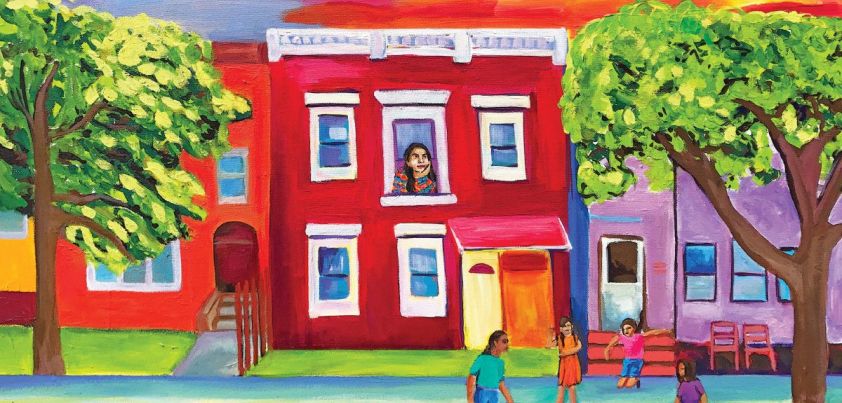 Cleófilas, Sandra Cisneros’s Mexican protagonist, finds the grass no greener when she marries and moves to a town “on the other side”. Poverty, language and distance leave her with nobody to turn to when her dreams of love and passion become a nightmare. Fortunately, her father has foreseen the possibility and left the home door open. Thanks to a kind woman with a pickup truck and piercing scream, she returns stronger and, one hopes, empowered to strive for a better future. Themes: parental vs. romantic love, cultural traditions (wives as ‘property’), gender roles, isolation, marital abuse. More…
Cleófilas, Sandra Cisneros’s Mexican protagonist, finds the grass no greener when she marries and moves to a town “on the other side”. Poverty, language and distance leave her with nobody to turn to when her dreams of love and passion become a nightmare. Fortunately, her father has foreseen the possibility and left the home door open. Thanks to a kind woman with a pickup truck and piercing scream, she returns stronger and, one hopes, empowered to strive for a better future. Themes: parental vs. romantic love, cultural traditions (wives as ‘property’), gender roles, isolation, marital abuse. More…
Archives
Eleven
 This children’s story by Sandra Cisneros was initially rejected because the publisher thought the themes were too deep for children. It has since become one of the most widely taught stories in Elementary Schools. A misunderstanding at school over an ugly red sweater spoils a girl’s eleventh birthday. Her teacher is convinced the sweater is the girl’s and demands that she put in on. The girl does so but then breaks down in tears, embarrassing herself in front of the class. This is a “coming of age” story that deals with the difficult concepts of vanity and timidity. More…
This children’s story by Sandra Cisneros was initially rejected because the publisher thought the themes were too deep for children. It has since become one of the most widely taught stories in Elementary Schools. A misunderstanding at school over an ugly red sweater spoils a girl’s eleventh birthday. Her teacher is convinced the sweater is the girl’s and demands that she put in on. The girl does so but then breaks down in tears, embarrassing herself in front of the class. This is a “coming of age” story that deals with the difficult concepts of vanity and timidity. More…
My Lucy Friend Who Smells Like Corn
 Many of Sandra Cisneros’s stories are vignettes (narrative descriptions without a plot). This one provides a snapshot of a young girl’s relationship with her friend Lucy. The two girls identify as Chicanos (USA born Mexican-Americans). Cisneros makes extensive use of Chicano dialect and fragmented sentences to create a realistic atmosphere. The narrator’s tone (feisty) is also typical of Chicano youth. The main theme is, of course, friendship. However, a closer read will reveal deeper themes and emotions beneath the narrator’s bravado. These include ‘aloneness’ (the wish for a large, close family like Lucy’s) and envy for Lucy’s freedom and independence. More…
Many of Sandra Cisneros’s stories are vignettes (narrative descriptions without a plot). This one provides a snapshot of a young girl’s relationship with her friend Lucy. The two girls identify as Chicanos (USA born Mexican-Americans). Cisneros makes extensive use of Chicano dialect and fragmented sentences to create a realistic atmosphere. The narrator’s tone (feisty) is also typical of Chicano youth. The main theme is, of course, friendship. However, a closer read will reveal deeper themes and emotions beneath the narrator’s bravado. These include ‘aloneness’ (the wish for a large, close family like Lucy’s) and envy for Lucy’s freedom and independence. More…
My Name / Geraldo No Last Name
 What’s in a name? These two vignettes from Sandra Cisneros answer the question from different viewpoints. The narrator is unhappy with the anglicized spelling of her name (Esperanza) but proud of what it symbolizes — the strength of her great-grandmother who defied the Mexican stereotype of women being weak and subservient to their men. It provides a link to her heritage. Neighbor Geraldo, who illegally entered the USA for a better life, has no official name or identity. One moment, full of life and promise at a dance club. The next, dead with nobody to care or mourn his passing. More…
What’s in a name? These two vignettes from Sandra Cisneros answer the question from different viewpoints. The narrator is unhappy with the anglicized spelling of her name (Esperanza) but proud of what it symbolizes — the strength of her great-grandmother who defied the Mexican stereotype of women being weak and subservient to their men. It provides a link to her heritage. Neighbor Geraldo, who illegally entered the USA for a better life, has no official name or identity. One moment, full of life and promise at a dance club. The next, dead with nobody to care or mourn his passing. More…
The House on Mango Street / Those Who Don’t / Alicia and I Talking…
 Today we have three short vignettes from Sandra Cisneros’s House on Mango Street. Each deals with an aspect of “place”. The protagonist’s Mexican-American family moves to a new neighborhood. Although far from perfect, their small house is special because they own it. It lies in a Hispanic part of town that most outsiders consider dangerous. However, the only time they feel scared is if they drive through “another color’s” neighborhood. A year later, the protagonist reflects on why the house (of which she is ashamed) doesn’t yet feel like home. Themes: childhood, family, shame, belonging, house vs. home. More…
Today we have three short vignettes from Sandra Cisneros’s House on Mango Street. Each deals with an aspect of “place”. The protagonist’s Mexican-American family moves to a new neighborhood. Although far from perfect, their small house is special because they own it. It lies in a Hispanic part of town that most outsiders consider dangerous. However, the only time they feel scared is if they drive through “another color’s” neighborhood. A year later, the protagonist reflects on why the house (of which she is ashamed) doesn’t yet feel like home. Themes: childhood, family, shame, belonging, house vs. home. More…